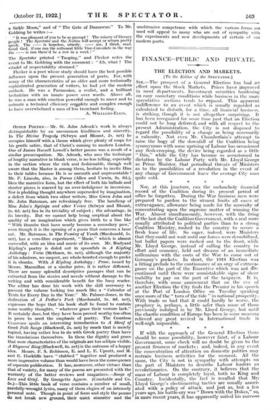OTITER POETRY. —Mr. St. John Adcoe,k's work is always distinguishable by
an uncommon kindliness and sincerity. In The Divine Tragedy (Selwyn and Blount, 5s. net) he occupies himself with a theme which gives plenty of scope for his gentle satire, that of Christ's coming to modern London. One of James Russell Lowell's better poems was a result of a similar preoccupation. Mr. Adcock, who uses the technique of lengthy narrative in blank verse, is no less telling, especially in the section where the rich and fashionable, though well aware that the Master is among them, hesitate to invite Him to their tables because He is so uncouth and unpresentable ! Mr. F. Lincoln, also, in Poems (Allen and Unwin, 3s. 6(L), likes the narrative form, but the effect of both his ballads and shorter pieces is marred by an over-indulgence in inversions. Nor is plodding thought anywhere superseded by imagination, a defect from which two other writers, Miss Gwen John and Mr. John Bateman, are refreshingly free. The handicap of Miss John's Syringa and other Verses (Selwyn and Blount, 2s. 6d. net) lies in its triviality of subject ; the advantage, in its brevity. But we cannot help being sceptical about the quality of an imagination which gives birth to a line like " With thumbs that have nearly become a secondary paw," even though it is the opening of a poem that concerns a lame cat. Mr. Bateman, in The Passing of Youth (Macdonald, 5s. net), has a vers-libre experiment, " Music," which is almost successful, with an idea and music of its own. Mr. Rudyard Kipling's poetry is doled out in spoonfuls in A Kipling Anthology : Verse (Methuen, 6s. net), although the majority of his admirers, we suspect, are whole-hearted enough to prefer it in chunks. With A Kipling Anthology : Prose, issued by Messrs. Macmillan at a similar price, it is rather different. There are many splendid descriptive passages that can be extracted from the stories and novels without damage to the writing and with considerable benefit for the busy reader. The editor has done his -work with the skill necessary to prevent the volume looking too much like a " Calendar of Texts for Every Day in the Year." Mr. Palmer-Jones, in the dedication of A Pedlar's Pack (Macdonald, 3s. 6d. net), expresses the hope that his book shall be found to contain some worthy thoughts, whatever grace their vesture lack:" It certainly does, but they have been proved worthy too often in prose to need the emphasis of poetry. The Countess Cesaresco spoils an interesting introduction to A Sheaf of Greek Folk Songs (Blackwell, 5s. net) by much that is merely topical, having rather less to do with Greek poetry than have the translations themselves. In these the dignity and grace that were characteristics of the originals are too seldom visible. A Rhymers' Ring {Blackwell, 6s. net) is the outcome of a happy idea. Messrs. F. S. Robinson, E. and L. E. Upcott, and M. and E. Hockliffe have " clubbed " together and produced a more impressive volume than would have been the consequence of separate publication. It has, moreover, other virtues than that of variety, for many of the poems are presented with the warranty of the better reviews and magazines.—Sougs of Love and Grief. By Georgette Agnew. (Constable and Co. 5s.)—This little book of verse contains a number of small, carefully-wrought lyrics, many of them elegies of an intensely Personal note. Though in point of form and style the poems do not break new ground, their quiet sincerity and the
unobtrusive competence with which the various forms are used will appeal to many who are out of sympathy with the experiments and new developments of certain of our modern poets.


































































 Previous page
Previous page